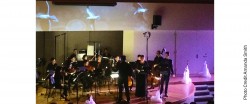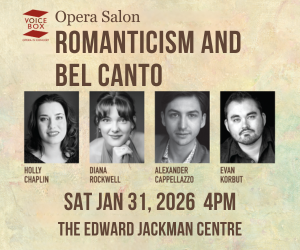 The Canadian premiere of Italian composer Salvatore Sciarrino's (b. 1947) opera The Killing Flower (Luci mie traditrici) was presented on February 1, at Walter Hall in the Edward Johnson Building of the University of Toronto. Sciarrino has been the Roger D. Moore Distinguished Visitor in Composition at the U of T Faculty of Music during the 2017 edition of the U of T New Music Festival. It had been originally billed as an “on book” (not acted, with the singers reading their parts) performance, by producer Wallace Halladay. But in fact, even with minimally added elements of stagecraft devised by stage director/designer Amanda Smith, such as discrete projections, simple props and appropriate stage direction, the performance had the feeling of a production, rather than a reading.
The Canadian premiere of Italian composer Salvatore Sciarrino's (b. 1947) opera The Killing Flower (Luci mie traditrici) was presented on February 1, at Walter Hall in the Edward Johnson Building of the University of Toronto. Sciarrino has been the Roger D. Moore Distinguished Visitor in Composition at the U of T Faculty of Music during the 2017 edition of the U of T New Music Festival. It had been originally billed as an “on book” (not acted, with the singers reading their parts) performance, by producer Wallace Halladay. But in fact, even with minimally added elements of stagecraft devised by stage director/designer Amanda Smith, such as discrete projections, simple props and appropriate stage direction, the performance had the feeling of a production, rather than a reading.
The story of the opera, as told by Sciarrino (who wrote both libretto and score), is based on the life of the unusual Renaissance composer, Carlo Gesualdo (1566-1619) – a composer Sciarrino has admired since youth, who was also Prince of Venosa and Count of Conza in southern Italy. The tragic story of the opera focuses not on the Prince's creative genius, but rather on his role in the murders of his wife and her lover. It's told in two acts, divided into a prologue, eight scenes, three instrumental intermezzi and two brief movements titled Darkness I and Darkness II. The two main characters are the Duke and the Duchess, initially an apparently happy couple. They are joined by the Guest, who precipitates an affair with the Duchess, and the Duke's servant, whose report of the affair leads to the murders.
In his artistic statement, Sciarrino stated that this opera “was meant to be a statement on the reform of theatre.” He said, “The use of voices, the invention and maturation of the vocal style, allow us to delve into the realm of theatre, rather than simply putting vocalists on stage and having them sing. Its strength lies in the expression of song, in the creation of a vocal style – a newly invented style.”
True to this philosophy, the entire drama appeared to be contained in and conveyed through the vocal lines. For example, the Duke is given a stiff, commanding vocal style, while the Duchess's style is pliable, sensitive and fluid. The Guest sings in a languid, probing and seductive style, while the servant has a jerky, abrupt style, making him seem nervous and insecure. The cast was superb in conveying this “drama of styles.” Baritone Geoffrey Sirett was commanding as the Duke; soprano Shannon Mercer was a sweet and sensitive Duchess, vulnerable and ready to please; countertenor Scott Belluz (the guest) was seductive and not to be resisted; and tenor Keith Klassen played a supremely neurotic servant. A recording of soprano Nathalie Paulin conveyed the prologue, sung in an elegant, fluid yet slightly mournful style that floated over the beginning of the piece.
It was easy to track the course of the drama, thanks to the composer's carefully crafted melodic characterizations. The commanding Duke, the compliant Duchess and obedient servant were all crystal clear in their roles. In the erotic scene with the Guest and the Duchess, the intertwining melodies wrapped themselves up in all manner of contortions, just as bodies might have. Sciarrino's orchestration was just as notable, supporting the action with the most remarkably vivid noises to come from a chamber orchestra. For example, brass instruments provided plenty of wind sounds when needed, the thunder sheets were wonderfully ominous, played softly, but with sufficient gravitas, and the flutes followed the singers with ample amplifications of their heightened emotional states as the drama unfolded. Conductor Chad Heltzel, a DMA candidate at U of T with Uri Mayer, balanced the ensemble nicely and sustained the many moods of the piece. At several times, the effect of high, chirping violins combined with deep, grunting trombones was positively creepy!
An added feature of the evening was a pre-performance discussion with the composer, Salvatore Sciarrino, the producer, Wallace Halladay, and U of T New Music Festival coordinator, Norbert Palej, coordinated by musicologist Catherine Moore. Among various revelations, we heard of Sciarrino's fascination with the music of Gesualdo, and also of Halladay's determination to produce The Killing Flower. Five U of T Theatre for Early Music madrigalists, sopranos Julia Morson and Maeve Palmer, countertenor Ryan McDonald, tenor Cory Knight and bass Andrew Adridge sang two Gesualdo madrigals, Mercè, grido piangendo and Asciugate I begli occhi, and established the flavour of music in Venosa during the Renaissance. It was a memorable evening!
The University of Toronto New Music Festival runs from January 29-February 5. For details, visit https://music.utoronto.ca/concerts-events.php.
David Jaeger is a composer, producer and broadcaster based in Toronto.



